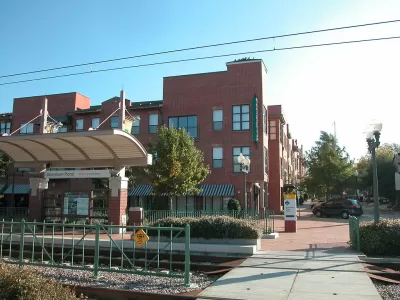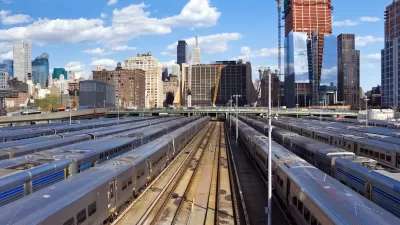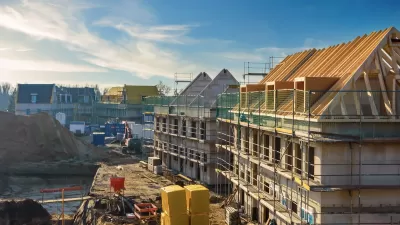No-cost land transfers of underused transportation assets to develop transit-oriented affordable housing could be a game changer for local governments.

Under new guidance from the US Department of Transportation, localities can use assets like land and buildings acquired or improved with federal transit funds to support development of affordable housing, report Jorge González-Hermoso and Yonah Freemark of the Urban Institute.
The new guidelines, called Interim Asset Disposition Guidance, released in October, could help boost housing construction near transit, which has slowed because of increasing development costs and a slow return of transit ridership after the pandemic.
Qualifying transportation assets that are no longer needed for the original purchase can be transferred to local governments, nonprofit organizations, or third-party entities at no cost as long as the properties are used for transit-oriented developments where at least 40 percent of housing units are reserved for low or very low income households. This has huge implications for viability of such projects, as previously transit agencies had to pay back the federal monetary contribution when seeking to transfer assets to other entities.
The Urban Institute speculates a significant portion of available unused land holdings were likely used for construction staging near large projects like rail routes, elevated lines, or subways. As such, they offer several recommendations to ensure state and local governments can take full advantage of these new rules to both increase affordable housing and transit ridership.
Those tips include ensuring zoning policies on land adjacent to stations align with the goal of maximizing density on those sites, focusing affordable housing subsidies on projects that are located on underused, transit-adjacent sites, and planning for property disposition at the start of any new transit project to ensure planning for residential investments can begin as soon as possible.
FULL STORY: Leveraging Underused Transit Properties Could Produce More Affordable Housing

Maui's Vacation Rental Debate Turns Ugly
Verbal attacks, misinformation campaigns and fistfights plague a high-stakes debate to convert thousands of vacation rentals into long-term housing.

Planetizen Federal Action Tracker
A weekly monitor of how Trump’s orders and actions are impacting planners and planning in America.

In Urban Planning, AI Prompting Could be the New Design Thinking
Creativity has long been key to great urban design. What if we see AI as our new creative partner?

King County Supportive Housing Program Offers Hope for Unhoused Residents
The county is taking a ‘Housing First’ approach that prioritizes getting people into housing, then offering wraparound supportive services.

Researchers Use AI to Get Clearer Picture of US Housing
Analysts are using artificial intelligence to supercharge their research by allowing them to comb through data faster. Though these AI tools can be error prone, they save time and housing researchers are optimistic about the future.

Making Shared Micromobility More Inclusive
Cities and shared mobility system operators can do more to include people with disabilities in planning and operations, per a new report.
Urban Design for Planners 1: Software Tools
This six-course series explores essential urban design concepts using open source software and equips planners with the tools they need to participate fully in the urban design process.
Planning for Universal Design
Learn the tools for implementing Universal Design in planning regulations.
planning NEXT
Appalachian Highlands Housing Partners
Mpact (founded as Rail~Volution)
City of Camden Redevelopment Agency
City of Astoria
City of Portland
City of Laramie





























